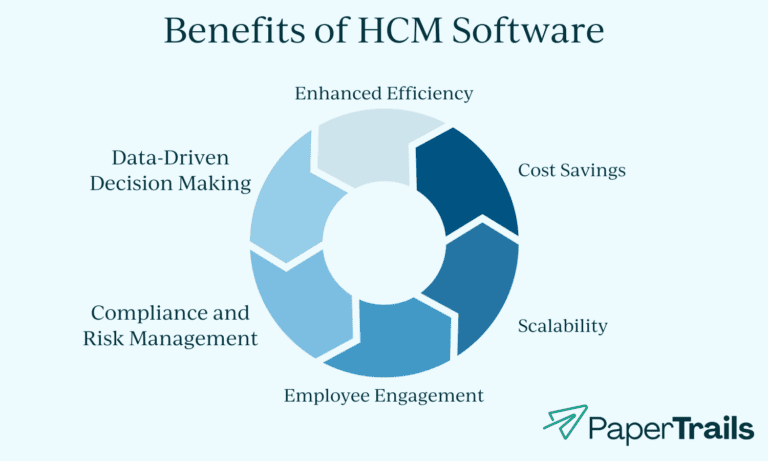In today’s fast-paced business landscape, managing your workforce efficiently and effectively is vital for growth and success. For small and medium-sized businesses, Human Capital Management (HCM) software can be a game-changer. In this article, we’ll dive into what HCM software is, why it’s crucial for all businesses, and whether small businesses should consider integrating it into their operations. We’ll also explore the distinctions between HCM and HR and provide guidance on what to look for when selecting an HCM vendor.
At Paper Trails, our mission is to provide pertinent information to small to medium-sized business owners and HR professionals to help their effectively manage their business. Human capital management software is something we believe highly in. That is why we use isolved HCM software to assist businesses in Maine and the Northeast, making HR and payroll management a breeze.
Let’s get started.
What is Human Capital Management software?
Human Capital Management (HCM) software is an integrated system of tools and applications designed to streamline HR and workforce management tasks. It includes a number of functions, including but not limited to:
- Payroll Processing: HCM software first and foremost ensures accurate and timely compensation for your employees by automating payroll calculations, payroll tax filings, and direct deposits.
- Time and Attendance: Track employee hours and time, attendance, leave requests, and more to help employers and managers implement schedules and track labor costs.
- Benefits Administration: This type of software allows employers to simplify benefits enrollment, management, and compliance with healthcare, retirement plans and other benefits.
- Employee Self-Service: HCM software typically includes a self-service portal that empowers the employees to access their own information, request time off, and update personal details, reducing HR’s administrative burden.
- Recruitment and Onboarding: Attract top talent, streamline the hiring process, and ensure seamless onboarding for new employees with recruitment and onboarding tools with HCM software.
What are the benefits of HCM software for small businesses?

HCM software offers several compelling benefits that can transform the way businesses of all sizes manage their workforce:
- Enhanced Efficiency: HCM software helps business owners and managers by automating time-consuming tasks like payroll processing and benefits administration. This not only saves time but also reduces the risk of human errors, ensuring your employees are paid accurately and on time.
- Data-Driven Decision-Making: HCM software provides real-time analytics and insights into your workforce, enabling data-driven decision-making. You can monitor key metrics like employee performance, turnover rates, and workforce demographics to make informed choices about hiring, training, and development.
- Compliance and Risk Management: Staying compliant with ever-changing labor laws and regulations is critical. This type of software helps you navigate the complexities of HR compliance, from tax calculations to reporting requirements. This helps minimize the risk of costly penalties and legal issues.
- Employee Engagement: Engaged employees are more productive and committed employees. Integrated software includes self-service portals where employees can access their personal information, request time off, and participate in performance evaluations.
- Scalability: As your small business continues to grow, managing your workforce becomes more complex. HCM software is scalable and can adapt to the changing needs of your organization. Whether you’re hiring new employees, opening new locations, or expanding into new markets, your HCM solution can grow with you, maintaining efficiency and compliance.
- Cost Savings: While there’s an initial investment in implementing HCM software, the long-term cost savings are substantial. You reduce the need for extensive HR staff to handle administrative tasks, minimize payroll errors, and avoid legal fines.
HCM software empowers you to manage your workforce efficiently, make data-driven decisions, ensure compliance, engage employees, and position your business for growth. By investing in HCM software, pave the way for sustained success in today’s competitive business environment.
HCM sounds like HR, what's the difference?
There are some similarities but it’s essential to distinguish between HCM and HR. While HR focuses on managing personnel and their needs, HCM encompasses a broader spectrum, including the strategic utilization of human capital to achieve business objectives. HR is a component of HCM. HCM covers not only personnel management (HR) but also talent acquisition, development, and workforce optimization.
What should small businesses look for when shopping for an HCM vendor?
Choosing the right HCM vendor is crucial for the success of your implementation. Here are some factors to consider when evaluating potential vendors:
- Features and Functionality: Ensure that the HCM software offers the features you need, such as payroll processing, time and attendance tracking, and benefits administration.
- Scalability: Confirm that the software can grow with your business and accommodate your future needs.
- Integration: Assess whether the HCM software can integrate with your existing systems, such as accounting software or applicant tracking systems.
- Compliance: Verify that the vendor stays updated with changing labor laws and compliance requirements.
- Customer Support: Opt for a vendor that provides excellent customer support to address any issues or questions promptly.
Conclusion
In conclusion, Human Capital Management (HCM) software is a valuable tool for small and medium-sized businesses seeking to streamline HR processes, enhance workforce management, and stay competitive. At Paper Trails, we leverage isolved HCM software to assist businesses in Maine and the Northeast in achieving their HR and payroll goals. Contact us here to learn more about our services.
If you’re a small business owner or HR professional in search of an HCM solution tailored to your needs, consider exploring the possibilities that HCM software can offer. It’s an investment that can pay significant dividends in the long run, ensuring your business remains agile and well-prepared for the challenges of today’s dynamic business environment.